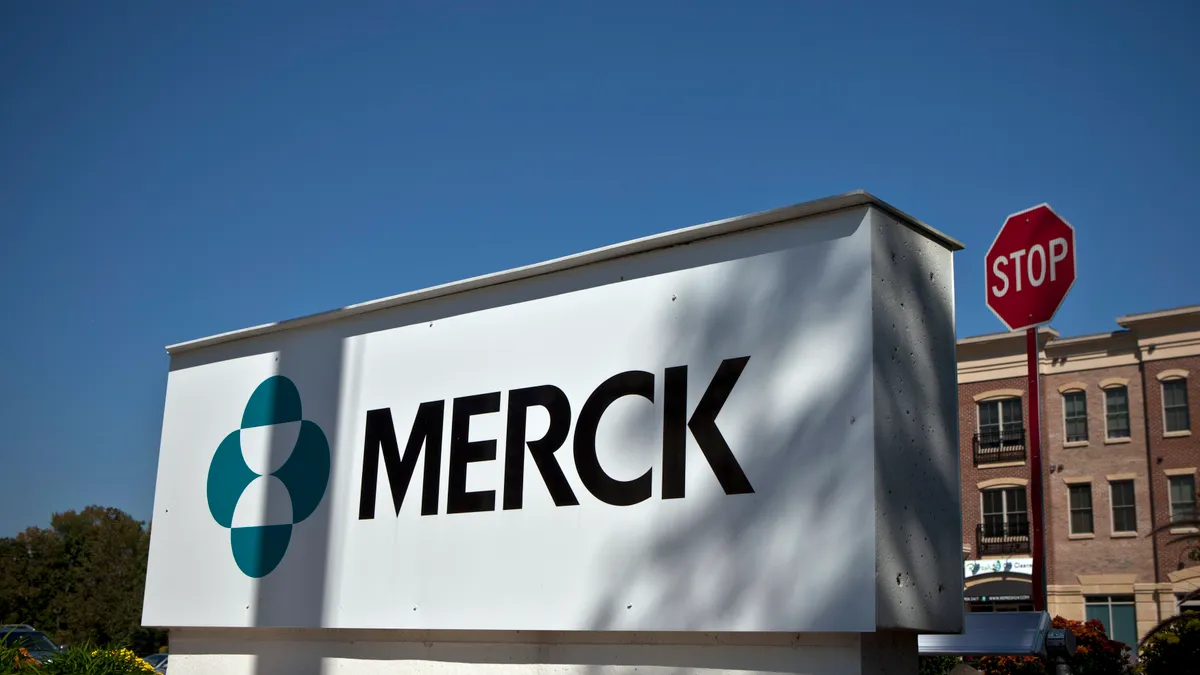Drugmakers are bracing for the financial impacts from lower prices now set in stone for 2026 by the CMS’ Medicare negotiation process. Overall, the final prices reveal deep price cuts for the government insurance program, with discounts ranging from 38% to 79%.
When the prices go into effect, people with Medicare Part D plans stand to save $1.5 billion, but for drugmakers, the negotiated prices are unwelcome news. Executives at some of the companies affected in the 2026 wave have largely downplayed the impact to their bottom line in second-quarter earnings calls, but the IRA’s ongoing implementation will hit some of Big Pharma’s bestselling drugs hard.
Drug price damage
Merck & Co. is facing the biggest percentage cut in the list price for its diabetes drug Januvia. However, the drug’s revenue declined during the first half of 2024 due to decreased demand and generic competition, according to the company’s earnings report. In 2026, Medicare will pay $113 for a 30-day supply of Januvia, a 79% discount from the 2023 list price of $527, sure to accelerate that falling revenue even further.
Januvia isn’t likely to make a huge dent in Merck’s overall financial health, though. The company reported more than $16 billion in sales during the first half of the year, thanks in part to a 16% increase in sales of its cancer blockbuster Keytruda. Januvia, by comparison, accounts for about 5% of total sales.
AstraZeneca’s Farxiga, another diabetes medication, is also discounted heavily in the CMS’ new numbers, with a 68% price change for 2026. The drug is a big seller for AZ, making up $3.8 billion in revenue out of the company’s $25.6 billion for the first half of the year, according to the latest earnings report.
Beyond diabetes, the blood thinner Eliquis also faces a significant discount with a 56% price drop. Bristol Myers Squibb, which owns the drug with partner Pfizer, said the new price does not reflect the value of the medication, used by almost 4 million Medicare patients in 2023. Eliquis was both BMS and Pfizer’s top-selling drug during the first half of 2024, raking in $7.1 billion in revenue –– about 29% of the BMS’ total revenues of $24 billion, according to its earnings report. Pfizer reported $3.9 billion in Eliquis revenue during the first six months of 2024.
BMS noted the drug pricing program does not necessarily change what Medicare patients will pay for Eliquis in a statement Thursday, saying that insurance plans and pharmacy benefit managers are likely to play a bigger role.
More industry impacts
The drug pricing program had the potential to save Medicare $6 billion if it were in place last year, according to the CMS. But the industry’s lobbying group, PhRMA, placed the blame elsewhere, noting the program doesn’t address other sources of high drug prices, such as pharmacy benefit managers. PhRMA also claimed the Medicare price negotiation program as designed won’t actually help lower drug prices.
“There are no assurances patients will see lower out-of-pocket costs because the law did nothing to rein in abuses by insurance companies and PBMs who ultimately decide what medicines are covered and what patients pay at the pharmacy,” PhRMA president and CEO Steve Ubl said.
Further, the association disagreed that the back-and-forth between CMS and drugmakers over the last several months has been a true negotiation.
Still, CMS said it “engaged in genuine, thoughtful negotiations with each participating drug company,” revising price offers upwards during the process. In half of the selected drugs, the CMS and pharmas were able to reach an agreed price, while for the other half, drug companies accepted the written final offer at the end of the negotiations, the agency said.
PhRMA also noted in its statement that the IRA will have longer-term implications not yet realized, including which types of drugs and treatment they will pursue in R&D.
“Companies are already changing their research programs as a result of the law, and experts predict this will result in fewer treatments for cancer, mental health, rare diseases and other conditions,” Ubl said. “Medicine development is a long and complex process, and the negative implications of these changes will not be fully realized for decades to come.”










